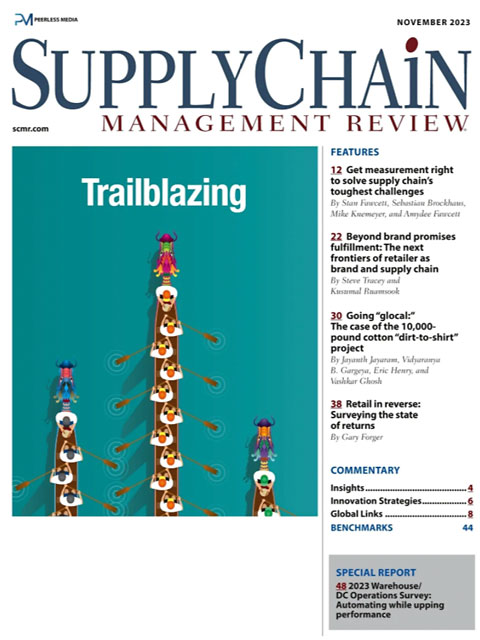Sorry, but your login has failed. Please recheck your login information and resubmit. If your subscription has expired, renew here.
November 2023
Last month, I had the pleasure of attending the NextGen Supply Chain Awards in Chicago. It was my first time attending the conference, which was in its fifth year, and I came away impressed with both the content and the quality of professionals I met in Chicago. This year’s conference—Strategies for a Digital Future—featured nearly 50 speakers and included CEOs and senior vice presidents, founders and innovators, leading academics and researchers, and top consultants. Over two days of the event at the Chicago Athletic Association, we learned more about artificial intelligence and predictive analytics, robotics and machine learning, fulfillment… Browse this issue archive.Need Help? Contact customer service 847-559-7581 More options
A major shift in the focus of branding has occurred in the last two decades. Traditionally, brands were associated with products, and consumers purchasing those products were often unaware of the company behind them. Today, a growing number of companies place greater emphasis on corporate brands and corporate-dominant brand architecture as a means to navigate the competitive and hyperconnected market environment. For these companies, their corporate brands become an expression of the corporate strategic intent that forms the epicenter of the firm’s identity and the purposes behind its existence. As such, corporate brands foster a new way of thinking about business strategy and create greater flexibility for future growth unbound by specific product or service categories.
While the tech sector has consistently been home to top brands (e.g., Apple, Google, Microsoft) in several brand ranking reports, the retail sector continues to thrive, boosted by the e-commerce boom. Many of the most successful corporate brands in the world, in fact, are retailer brands. In various cross-sectional brand ranking reports (e.g., Brand Finance Global 500, Interbrand Best Global Brands), top-ranked brands such as Amazon, Walmart, The Home Depot, and Ikea are among examples of retailer brands that have succeeded in building outstanding corporate brands over time.
Notably, largely ascribed to the continued rise of e-commerce, retailers as brand (hereafter referred to as retailer brand) appear to be at an inflection point in their development in recent years. We observe that supply chain management, especially the distribution and logistics elements, has become the forefront of retail branding strategies. Most notably, the roles of fulfillment and last-mile logistics are expanding beyond the crucial enabler of brand promise delivery to be an extension of the retailer brand itself.
To further highlight how distribution and logistics are revolutionizing corporate branding strategies in the retail sector, we first provide a conceptual lens of the corporate brand–supply chain nexus in cultivating an authentic corporate brand. Then, using Amazon as an exemplar, we discuss how this highly successful retailer brand leverages the power of effectively crafted supply chain processes in enhancing the authenticity and value of its brand.
Cultivating an authentic corporate brand
Despite the increased applications of corporate branding across business sectors, many companies still struggle to achieve the full potential of their corporate brands. Research studies show that shortfalls may be attributable to the lack of a value proposition supporting the brand, inconsistency between brand values and those held by stakeholders, misalignment between internal and external efforts, and/or failure to deliver brand values. Essentially, these underperforming corporate brands lack authenticity.

This complete article is available to subscribers only.
Log in now for full access or start your PLUS+ subscription for instant access.
SC
MR
Sorry, but your login has failed. Please recheck your login information and resubmit. If your subscription has expired, renew here.
November 2023
Last month, I had the pleasure of attending the NextGen Supply Chain Awards in Chicago. It was my first time attending the conference, which was in its fifth year, and I came away impressed with both the content and… Browse this issue archive. Access your online digital edition. Download a PDF file of the November 2023 issue.A major shift in the focus of branding has occurred in the last two decades. Traditionally, brands were associated with products, and consumers purchasing those products were often unaware of the company behind them. Today, a growing number of companies place greater emphasis on corporate brands and corporate-dominant brand architecture as a means to navigate the competitive and hyperconnected market environment. For these companies, their corporate brands become an expression of the corporate strategic intent that forms the epicenter of the firm’s identity and the purposes behind its existence. As such, corporate brands foster a new way of thinking about business strategy and create greater flexibility for future growth unbound by specific product or service categories.
While the tech sector has consistently been home to top brands (e.g., Apple, Google, Microsoft) in several brand ranking reports, the retail sector continues to thrive, boosted by the e-commerce boom. Many of the most successful corporate brands in the world, in fact, are retailer brands. In various cross-sectional brand ranking reports (e.g., Brand Finance Global 500, Interbrand Best Global Brands), top-ranked brands such as Amazon, Walmart, The Home Depot, and Ikea are among examples of retailer brands that have succeeded in building outstanding corporate brands over time.
Notably, largely ascribed to the continued rise of e-commerce, retailers as brand (hereafter referred to as retailer brand) appear to be at an inflection point in their development in recent years. We observe that supply chain management, especially the distribution and logistics elements, has become the forefront of retail branding strategies. Most notably, the roles of fulfillment and last-mile logistics are expanding beyond the crucial enabler of brand promise delivery to be an extension of the retailer brand itself.
To further highlight how distribution and logistics are revolutionizing corporate branding strategies in the retail sector, we first provide a conceptual lens of the corporate brand–supply chain nexus in cultivating an authentic corporate brand. Then, using Amazon as an exemplar, we discuss how this highly successful retailer brand leverages the power of effectively crafted supply chain processes in enhancing the authenticity and value of its brand.
Cultivating an authentic corporate brand
Despite the increased applications of corporate branding across business sectors, many companies still struggle to achieve the full potential of their corporate brands. Research studies show that shortfalls may be attributable to the lack of a value proposition supporting the brand, inconsistency between brand values and those held by stakeholders, misalignment between internal and external efforts, and/or failure to deliver brand values. Essentially, these underperforming corporate brands lack authenticity.
SC
MR


Latest Supply Chain News
- Joseph Esteves named CEO of SGS Maine Pointe
- Employees, employers hold divergent views on upskilling the workforce
- April manufacturing output slides after growing in March
- Q1 sees a solid finish with positive U.S.-bound import growth, notes S&P Global Market Intelligence
- World Trade Centers offers a helping hand to create resilient, interconnected supply chains
- More News
Latest Podcast

 Explore
Explore
Business Management News
- Joseph Esteves named CEO of SGS Maine Pointe
- Employees, employers hold divergent views on upskilling the workforce
- April manufacturing output slides after growing in March
- Q1 sees a solid finish with positive U.S.-bound import growth, notes S&P Global Market Intelligence
- 6 Questions With … Sandeep Bhide
- MIT CTL offering humanitarian logistics course
- More Business Management
Latest Business Management Resources

Subscribe

Supply Chain Management Review delivers the best industry content.

Editors’ Picks






